- Home
- Jim Eldridge
Murder at the Manchester Museum Page 9
Murder at the Manchester Museum Read online
Page 9
‘As I understand it, it was a long time ago,’ said Daniel.
‘So was Waterloo, but I bet you remember that,’ said Bickerstaff bitterly.
‘Look, all we’re asking—’
‘Ask Hector Bleasdale,’ snapped Bickerstaff. ‘And after he’s told you his version, I’ll tell you the other side. The real story.’
With that, Bickerstaff disappeared through the door into the inner offices of the newspaper.
As they entered the museum, Abigail asked, ‘While we’re here, are we going to talk to Mr Steggles about getting in touch with this Hector Bleasdale?’
‘I thought I’d leave that until we bring him Bickerstaff’s article,’ replied Daniel. ‘He’s a very busy man, and I feel we don’t want to interrupt his work too often or he might get fed up with us.’
Instead, they made their way to the reading room where they sought out Jonty Hawkins.
‘Mr Hawkins, on the day the young woman was killed, did you notice any army types in the reading room?’
‘Army types?’
‘You know, military men.’
Hawkins shook his head. ‘No, there was nobody in an army uniform here that day.’
‘What about out of uniform?’
Hawkins looked at Daniel, then at Abigail, bewildered.
‘How would anyone know?’ he asked. ‘Out of uniform, military people look the same as anyone else.’
‘That’s true,’ said Daniel. ‘Thank you, Mr Hawkins.’
As they left the reading room, Abigail said, ‘That’s a very good point. How would anyone know? Out of uniform, military people look the same as anyone else.’
‘To ordinary people, I agree,’ said Daniel. ‘But not to another soldier. There’s a bearing about a professional soldier that marks them out. I agree there was no way someone like Hawkins should spot it, but there is someone at the museum who might.’
They made their way down to the cellar where they found Walter Arkwright sorting through small wooden crates.
‘Hello again, Mr Arkwright,’ said Daniel.
‘Sir, madam.’ Arkwright saluted. He gestured at the small wooden cases. ‘Just getting some more exhibits out of store in readiness for this talk Mr Dresser’s doing on birds. We’ve got some special pieces we’ve kept in store for just this occasion and I want to make sure they’re ready for the talk before I go on my annual holiday.’
‘When is that?’ asked Abigail.
‘Tomorrow,’ said Arkwright. ‘Me and Mrs Arkwright go to Blackpool every year at this time. It’s a pity because I’d have liked to be here to have things ready on the night for Mr Dresser’s talk, but Mr Steggles arranged it with Mr Dresser just a month ago and our holiday at Blackpool has been booked for almost a year. Me and the missus stay in the same boarding house, you see, Mrs Bailey’s, and she’s very popular so you have to book well in advance. But everything’ll be all right for the talk, I’ll make sure of that. Everything’s in place and I’ve got one of the young attendants, Edward Page, standing by to double-check things on the day. He’s young but he’s a good and reliable worker.’
‘I’m sure he is,’ said Daniel. ‘Mr Arkwright, you said you used to be a soldier.’
‘I did, sir, and I was.’
‘On the Thursday when the young woman was killed in the reading room, did you notice any military types in the museum? They most likely would have been wearing civilian clothes.’
Arkwright frowned. ‘Civilian?’ He thought, then said, ‘Out of uniform, most soldiers look the same as everyone else, honestly, sir. Except for officers. They look different.’
Yes, that’s it, thought Daniel. An officer, not an ordinary foot soldier.
‘Did you notice any such in the museum on that Thursday?’ he asked.
Arkwright fell silent, thinking hard. Then he said, ‘Now you come to mention it, there might have been. As I was coming down to the cellar I noticed a man near the entrance, and I thought I saw the shape of a scabbard under his long coat.’
‘A scabbard? For a sword?’
Arkwright shook his head. ‘No, not a sword. A regimental sword is long, and even a short sword would have poked out. No, it was more like a scabbard for a bayonet. You wear ’em attached to your belt.’
‘Can you describe this man? His facial features?’
Arkwright shook his head.
‘I only saw him from the back, and just a glance, really.’
‘So, an officer in civilian clothes with a bayonet in a scabbard,’ said Daniel as they headed back to their hotel. ‘And a bayonet is a weapon that fits the injuries. Steggles was supposed to meet Brigadier Wentworth at the museum that day, then the brigadier cancelled at the last moment. But say he didn’t? Say he cancelled his meeting with Steggles, but he came to the museum anyway, and killed the two women.’
‘But why cancel his meeting with Steggles?’ asked Abigail. ‘If he was spotted at the museum by anyone, that was his reason for being there. His alibi.’
‘Unless his note of cancellation was to back up his lie about not being at the museum. And, if he was spotted by anyone, he could say things had changed and he was able to come after all.’
‘In which case, why didn’t he go to see Steggles?’
Daniel frowned. ‘Because he didn’t think he’d be spotted so he went with his original plan – to pretend he wasn’t at the museum, with his note as evidence. But an officer was there on that day, armed with a bayonet. If it wasn’t Brigadier Wentworth, who was it?’
True to his word, Bickerstaff’s article was waiting for them at their hotel.
Abigail studied it first.
‘How does it read?’ Daniel asked.
‘Surprisingly moderate,’ said Abigail. ‘It states the facts, with the names of the two women, and where they were found. It also mentions the museum bringing us in to investigate.’
‘Does he castigate the police?’
‘No,’ said Abigail. ‘To be honest, after what Mr Bickerstaff threatened to publish about Inspector Grimley and the local force, I expected a far more angry piece.’ She handed the pages to Daniel. ‘I believe Mr Steggles will find nothing there to worry him.’
‘In that case, we’ll take it straight to him. And at the same time we’ll talk to Mr Steggles about arranging a meeting with this Mr Bleasdale.’
They delivered Bickerstaff’s article to Steggles, who expressed his pleasant surprise at the tone, commenting, ‘I’m relieved to see that Mr Bickerstaff has respected my wishes. I feared he might be too extreme in his condemnation of the police, and in particular name Inspector Grimley, which could lead to a rift between the police and the museum. In a burgeoning city like Manchester, it is vital that the different arms of the social structure work together, judicial and artistic, if we are to avoid creating anarchy.’
‘There’s one other thing,’ said Daniel. ‘We’re trying to find out what Kathleen Donlan may have been asking about at the barracks that resulted in her being turned away. It was something that happened about eighty years ago, which means it could be connected with Waterloo, or even this Peterloo incident. Or possibly something else that happened about that time. What we’d like to do is talk to a local military historian to see if he can throw any light on what her interest may have been. I recall you mentioned someone called Hector Bleasdale.’
‘Hector Bleasdale indeed!’ Steggles beamed. ‘The perfect person! Would you like me to write a letter of introduction to him on your behalf?’
Daniel smiled. ‘Actually, that was what I was about to ask. You’re sure you don’t mind?’
‘Not at all!’ Then he gave a rueful smile. ‘I must admit it wouldn’t be completely altruistic on my part. Since this dreadful incident happened there’s been a lack of response when I’ve asked the army for further meetings about the exhibition we’re planning. I wrote to Brigadier Wentworth last Friday asking when we could meet to move things forward, but he hasn’t replied. Of course, he may be very busy, but it’s unlike him not to resp
ond. Writing to Hector Bleasdale as an introduction to you will give me an opportunity to mention to him that we are keen to start making preparations for the exhibition.’
‘And I’ll be very happy to add a prompting of my own when I meet him,’ said Daniel. ‘If you think it might help.’
‘I believe it might. Mr Bleasdale is a very sociable man, very friendly, whereas the brigadier can be slightly stand-offish.’
‘In that case, I’ll write a brief note to Mr Bleasdale of my own, if you wouldn’t mind enclosing it with yours,’ said Daniel.
Daniel was unusually quiet during their meal, causing Abigail to remark on it. ‘You seem very thoughtful this evening,’ she commented.
‘I’m always thoughtful,’ said Daniel.
‘But this evening you seem particularly deep in thought. Something about the case puzzles you?’
‘Everything about this case puzzles me,’ admitted Daniel ruefully. ‘But no, I was thinking about this city. Manchester.’
‘Oh?’
‘I’m having difficulty reconciling the opinion of it expressed in your magazine as “the most modern city in Britain” and “the city of the future”. The two areas we’ve visited, Hulme and Ancoats, are just the same as many of the slum areas of London, places like Whitechapel and Shoreditch and the area around the back of King’s Cross station. Hardly “the city of the future”.’
‘That’s because those are the only two areas we’ve been to outside of the city centre, and those are where the workers live. It’s always been this way, throughout history. Ancient Rome was viewed as a marvel, a wonder to behold. Another “city of the future”. And parts of it were, the areas where the rich lived with hypocaust systems that gave the houses central heating, the sewage systems, the coliseum, the places of government. But it all needed a large labour force to keep it working, and they didn’t live in these luxurious houses. They lived in hovels crammed together in the poorer areas, without proper sanitation, and living on what scraps they could gather.’
‘So the Romans invented the slum, along with all their other innovations.’
‘Oh no. Slum conditions like that had been around as long as cities had existed. In ancient Egypt, for example. And until the day comes when the rich find a way to be able to live in luxury without the physical labour of the poor, it will always be that way.’
Daniel smiled. ‘Now it’s you who sounds like one of these radicals.’
‘Absolutely not,’ said Abigail. ‘I’m not arguing for a change to the system, I’m simply describing the way things are, how they’ve always been, and will continue to be. But if I were to argue for change, this city would be the place to do it.’
‘Why? As I’ve already remarked, the social inequality doesn’t seem any more unfair here than in London, or many other cities.’
‘But it’s here in Manchester there have been the biggest calls for social change,’ said Abigail.
Daniel frowned. ‘There was nothing about that in the magazine article.’
‘That article was mainly about technological revolutions. The cotton machines. The telephone system. The canals. But Manchester has been at the forefront of modern political thought for decades. Do you know the writings of Friedrich Engels?’
‘No,’ said Daniel. ‘But my guess is that I wouldn’t enjoy them. I’m averse to heavy tomes on political thought.’
‘You don’t know they’re heavy tomes,’ said Abigail.
‘Yes, I do,’ retorted Daniel. ‘From the way you mentioned them. Modern political thought. I have yet to hear of any of these modern political thinkers using few words.’
‘Yes, all right, his works do tend to be lengthy, and quite heavy in content,’ admitted Abigail.
‘You’ve read him?’
‘I started to,’ said Abigail.
‘Ha!’ Daniel exclaimed in triumph.
‘But other things interceded,’ said Abigail firmly. ‘My point is that Engels spent much of his life in Manchester, and his experiences here led to the development of his social philosophy. In fact, along with Karl Marx, it could be said that he developed Marxism.’
‘Ah, now Karl Marx I’ve heard of,’ said Daniel. ‘When I was in the Met we often used to get radicals attacking banks and such places, claiming it was in the cause of fairness and quoting Karl Marx.’ He looked at Abigail quizzically. ‘But I can’t recall him being associated with Manchester. For one thing, he’s buried in north London at Highgate Cemetery. There was a lot of fuss about it in the London papers at the time because he was buried in what’s known as Agnostics Corner, where George Eliot is buried.’
‘Mary Anne Evans,’ said Abigail.
‘Yes, if you want to be particular about it. I’m not getting into this,’ said Daniel, shaking his head. ‘I’m still curious about what Karl Marx has to do with Manchester.’
‘He came here to meet Engels,’ said Abigail.
‘I bet that was a cheerful conversation,’ said Daniel sourly. ‘Not many jokes and singing comic songs.’
‘They met at Chetham’s Library,’ continued Abigail. ‘Which has the distinction of being the oldest public reference library in Britain.’
‘And free to use?’ said Daniel, surprised.
Abigail nodded, then said, ‘It’s one of the places I intended to visit when I knew we were coming to Manchester.’ She gave a sigh. ‘So many things to see here.’
‘Mr Wilson?’
Daniel looked and saw that a hall porter had appeared by their table. He held out an envelope.
‘This has just been delivered for you.’
‘Thank you,’ said Daniel.
He opened the envelope and took out the neatly written letter it contained.
‘It’s from Hector Bleasdale,’ he said. ‘He says he’ll be delighted to meet us. He suggests eleven tomorrow morning at his house.’
Abigail looked unhappy at this. ‘We told Father O’Brien we’d go to see the O’Donnells with him tomorrow morning. That’s important.’
‘They’re both important,’ said Daniel. ‘I’m hoping that Mr Bleasdale will be able to throw some light on just what poor Kathleen Donlan was looking for.’
‘Then I suggest you go and see Mr Bleasdale, while I go and see the O’Donnells.’
‘On your own?’
‘With Father O’Brien.’
‘You know what I mean, a woman of means walking through that area on her own.’
‘Daniel, I am perfectly capable of looking after myself. And it might be better for it to be just me going. The eldest girl, Breda, seems to be the mainstay of the family, according to Father O’Brien. She might talk easier if it is to a woman. We’ve taken this case on; we owe it to the family.’
Daniel hesitated, then nodded. ‘You’re right, as you often are. I’ll see this Hector Bleasdale, you go and see the O’Donnells.’
‘And if Eve Preston arrives here at the same time looking for us?’ asked Abigail.
‘As I said, we’ll leave a note for her at reception asking her for a contact address. But I somehow think she won’t turn up.’
CHAPTER FIFTEEN
The next morning, at Daniel’s insistence, Abigail agreed to take a hansom to St Michael’s Church to meet Father O’Brien, but only under protest.
‘I am only doing this for your sake to make you feel at ease,’ Abigail told Daniel sternly. ‘I can’t have you meeting this man, Bleasdale, while you’re worried about me. It will affect the efficiency of the way you question him.’
‘Good,’ said Daniel.
‘However, I do intend to walk back to the hotel. And I insist I will be perfectly safe. Just because an area is poor it does not mean that everyone in it is of criminal intent.’
‘I can’t win against you,’ groaned Daniel.
‘I’m glad you’ve realised that.’ Abigail smiled. ‘It will make our life together much easier in the future.’
With that last riposte, Abigail hailed a hansom, gave the driver the address of St Michael’s Chu
rch in Ancoats, and set off.
A service was just finishing as Abigail arrived, with Father O’Brien standing outside saying goodbye to his parishioners. His face lit up with pleasure when he saw Abigail.
‘Miss Fenton, I wondered if you would come.’
‘I gave my word,’ said Abigail. ‘Mr Wilson will not be with us because he has another avenue to pursue. How did the family take the news?’
‘Sadly, Patrick’s gone to pieces,’ said O’Brien. ‘But he was never the strongest of people. It was Eileen who held that family together. The children were devastated, as you can imagine. While I was there Breda, John and Peter came home from work, so I was able to tell them the dreadful news. Those three, the oldest, are more stoical. I’m afraid their hard life has made them that way. Of them all, Breda’s the strongest one. She’s like her mother. She was the only one who didn’t cry yesterday, but that will come later. Right now she’s putting all her strength into making sure the family holds up, giving orders to the older ones while at the same time taking care of the young ones.’ He gave a sigh. ‘The middle ones are a bit left to their own devices, but that’s good in a way, because the three of them will support one another.’
‘Will my calling on them cause an upset?’ asked Abigail. ‘I don’t want to make things worse for them than they already are.’
‘No,’ O’Brien assured her. ‘In fact, it will do them good to see someone different, rather than just neighbours calling to offer sympathy. Actually, I was hoping you’d come today because I’ve been hearing words on the street from some of my parishioners that may have ideas for why Kathleen was murdered. Then again, it may have nothing to do with it, but I thought I’d share it with you.
‘You remember I said that Kathleen was likely from north Cork, the Mallow area? Well, it seems that two weeks before Kathleen arrived in England, a woman was killed in the town of Kanturk in north Cork. Kanturk’s about ten miles from Mallow. The man who did it was Con Gully, and it seems he stabbed his wife to death with a kitchen knife while he was out of his head on drink. By all accounts, he was a dangerous man, especially when he’d drink taken.

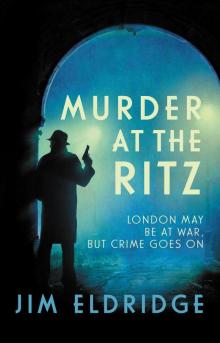 Murder at the Ritz
Murder at the Ritz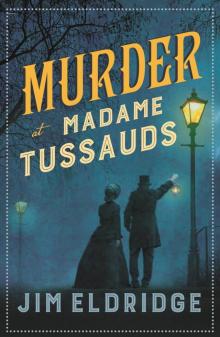 Murder at Madame Tussauds
Murder at Madame Tussauds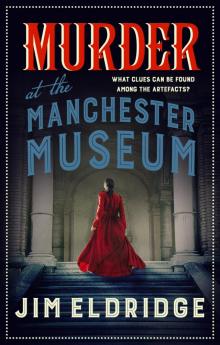 Murder at the Manchester Museum
Murder at the Manchester Museum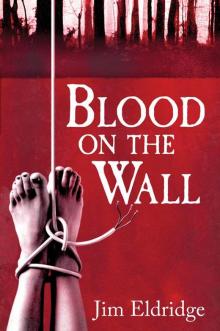 Blood On the Wall
Blood On the Wall 4.3.2.1
4.3.2.1 Jungle Kill (Black Ops)
Jungle Kill (Black Ops)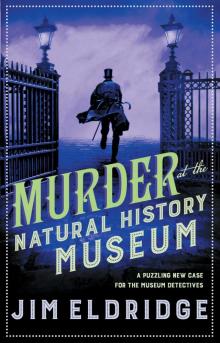 Murder at the Natural History Museum
Murder at the Natural History Museum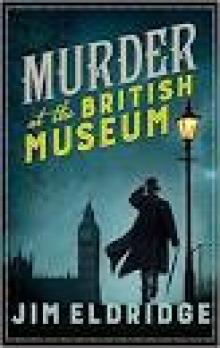 Murder at the British Museum
Murder at the British Museum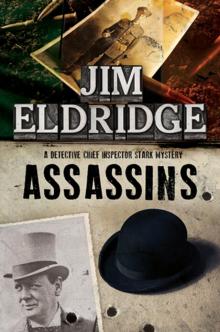 Assassins
Assassins Hunk and Thud
Hunk and Thud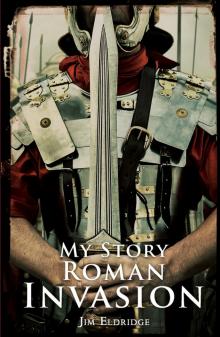 Roman Invasion
Roman Invasion Big Rock and the Masked Avenger
Big Rock and the Masked Avenger The Last Enemy
The Last Enemy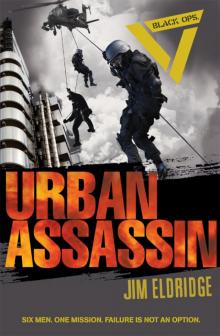 Urban Assassin
Urban Assassin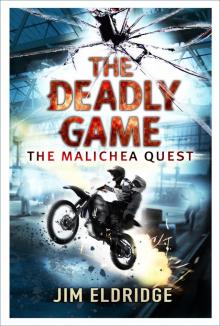 The Deadly Game
The Deadly Game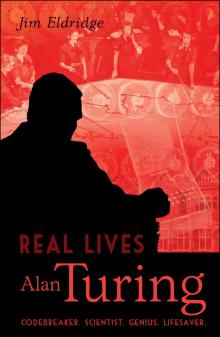 Alan Turing
Alan Turing The Lethal Target
The Lethal Target The Giant Rumble
The Giant Rumble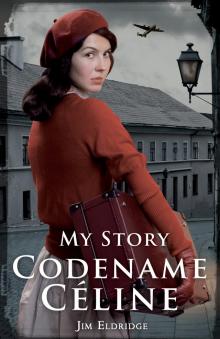 Codename Céline
Codename Céline Death in the Desert
Death in the Desert Escape from Pompeii
Escape from Pompeii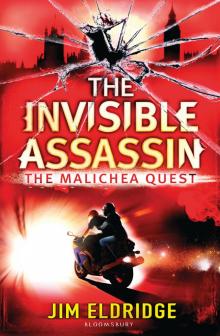 The Invisible Assassin
The Invisible Assassin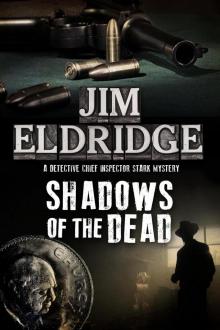 Shadows of the Dead
Shadows of the Dead Jack Versus Veto
Jack Versus Veto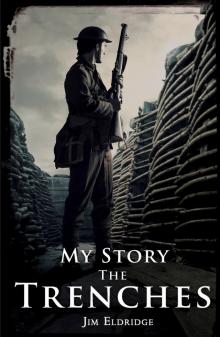 The Trenches
The Trenches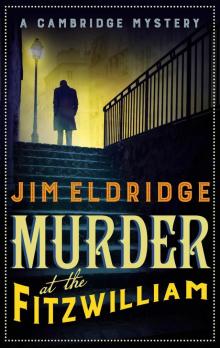 Murder at the Fitzwilliam
Murder at the Fitzwilliam Coming Home
Coming Home